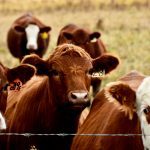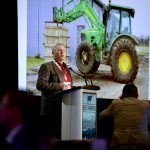Tag Archives Environment

Opinion: Persistent chemicals can be managed in livestock
Research shows that grazing and crop sites, along with seasonal affects change how chemical levels show up in livestock

Researchers examine role of soil microbes in GHG emissions
Guelph study compares coniferous, deciduous and grass riparian buffer zones

Opinion: Reaching ‘net zero’ will be a challenge for agriculture

United response needed to supply management threats
Outgoing Gay Lea CEO says there will continue to be opportunities for Canadian dairy

Another way to look at environmental metrics
Protein density and ecosystem impacts make meat competitive with grains, say researchers

Canada encouraged to aim for an agricultural moon shot
Royal Bank’s senior VP says agriculture industry should be a priority for all governments as he urges them to be ‘export obsessed’

Canadian dairy carbon-neutral guidebook released
Kitchen table meetings may be the next step for the introduction of the guide to farmers

New Lactanet breeding index tackles methane emissions
World-first approach uses mid-infrared milk data to estimate individual cow emissions

Lynn Leavitt named BFO’s Environmental Stewardship Award winner
The Prince Edward County beef farmer has the wrap on recycling agricultural plastic

Trudeau assures farmers fertilizer emissions target is voluntary
All leaders of major parties addressed farmers at the Canadian Federation of Agriculture annual meeting for the first time in memory

